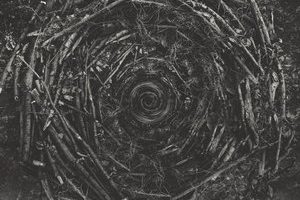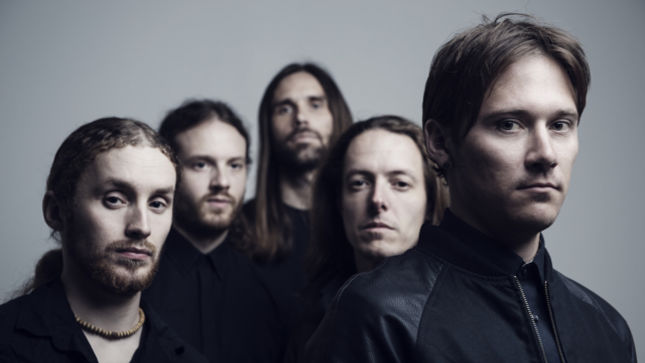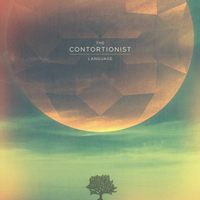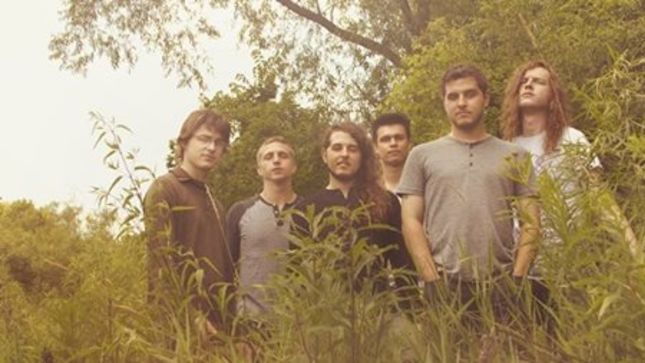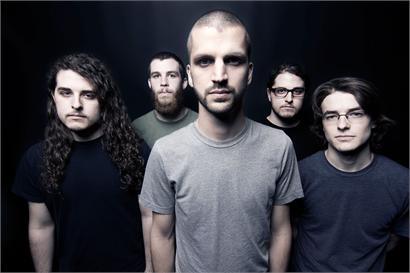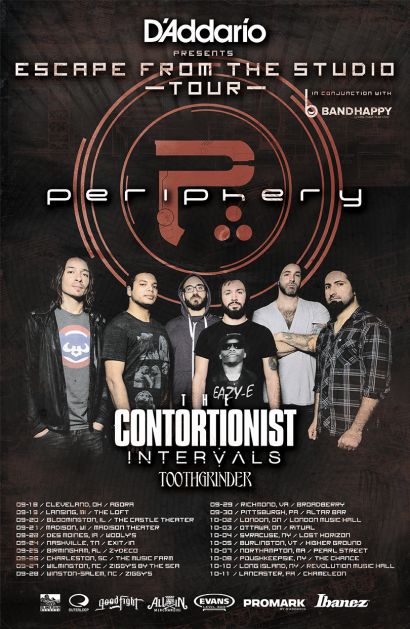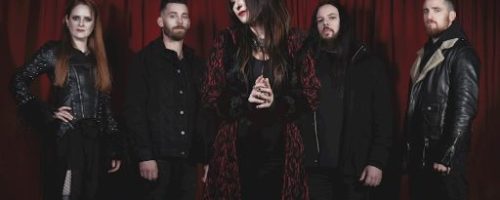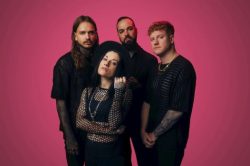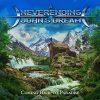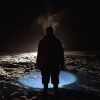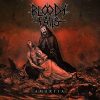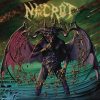The Contortionist – Change and Creativity
Tuesday, 5th September 2017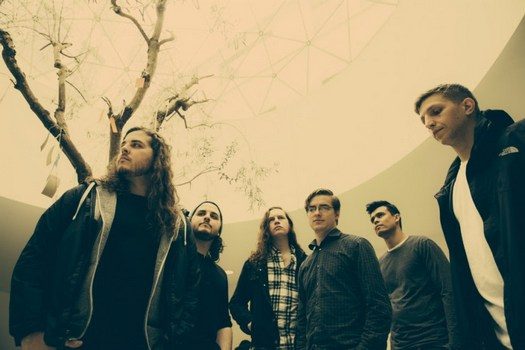
One of those bands that you can truly examine, The Contortionist are always one to take a step forward with each album. From the blunt heaviness that defined their first release, Exoplanet, to the shifts that following with subsequent releases, one thing was always key: they aren’t going to be a band that does the same thing twice. But you can follow the breadcrumbs to see what happens next. They also proved that they are a band that will challenge the listener and present things to them in ways that other bands within the scene just don’t.
Both of these things apply to the band’s fourth album, Clairvoyant. While the band’s intricate playing has been the one constant, there’s still some changes from that of their previous album, Language. For one, despite the technical playing, there’s a more straight-forward emotional pull to the material. Nothing is ever really simple with The Contortionist, but Clairvoyant just feels more instantly digestible than its predecessor. But to aid us with the process, we still were able to grab vocalist Michael Lessard for a quick Q & A.
Dead Rhetoric: The Contortionist has come a long way since Exoplanet. How would you describe the changes within your sound over time?
Michael Lessard: Simply put, I think it’s a matter of growing up. When Exoplanet was released the guys were around 19…a lot of that stuff had been written when they were 17. So just growing up – your interests’ change, your ideas of what you think is good or what you feel is important in the music changes. That’s kind of what’s happened to this band over the course of four albums.
Dead Rhetoric: Do you feel that most long-time fans have embraced the way that you seem to change over time?
Lessard: Some have, some haven’t. But with anything that you do, there will be people that enjoy it and people that don’t. I’m sure there are a lot of people who felt alienated once the band started changing its sound a bit. But the other thing is that there are a lot of people who have grown with the band. That’s kind of the cool thing about capturing a demographic that surrounds your age when you are young. Some of them tend to grow with you.
Dead Rhetoric: How does Clairvoyant bring The Contortionist to the next stage in your evolution?
Lessard: To us, it felt like the next step was to still be technical but disguise it. I that we wanted to have an album where the average listener could listen to it, and they could follow along and someone who understood what we are doing music theory-wise, can hear the intricate layers and how they are overlapping – all the stuff that’s happening there. So really the goal was to encompass those two different realms, and I think we did a good job. The other thing that this band has never really focused on was composition. A song would be A to B to C to D to E. That’s basically how it was for a long time. Every once in a while it would be A to B to C to D to E, and back to C, then song over. With this album, we wanted to try some new things.
Dead Rhetoric: I saw somewhere that it was discussed that you shifted away from more song-writing to album-writing. Is that a fair assessment?
Lessard: I think the band has always kind of been focused on album writing, but over the years we’ve all gotten a better grasp of it. Now what we are doing is trying to work on album writing as well as individual songs, so that they can stand alone…but they are all pieces to the whole.
Dead Rhetoric: Much of the album was written up in Maine – how do you feel your surroundings contributed to the final product?
Lessard: I think it contributed a lot. Whatever you surround yourself in, whether it’s a stressful environment or relaxing one, it will set the tone for your writing. It will make you feel a certain way. When you write, it’s based on your feelings and how you feel. The other great thing about Maine was that we were able to work with my dear friend and former bandmate, Evan Sammons, and have him come in with an outside perspective and give us a little guidance. That was pretty priceless.
We went to Maine in the fall/wintertime, which was perfect for this album, in terms of scenery. Language is a very uplifting album in a lot of ways – an album about growing and the bright side of things. This album is very much the opposite end of that. I personally wanted something lyrically and musically that would contrast that album. We are pretty firm believers in never putting out the same thing.
Dead Rhetoric: With the lyrics then, where do you draw that source from – it wasn’t that you just wanted to do the opposite, but how did that mindset impact your writing for this album?
Lessard: With this album, it’s actually a continuation from the underlying themes that were in Language. What Language is about, but hidden in metaphor – it’s a continuation from there. I don’t want to give away too much; I like to make our listeners work a little bit in terms of interpreting what it may be about. But the only thing that really changed was the way I used my words. I wanted something a little less vague. Language is very vague at times. Because of that, I wanted to be a little more grounded and honest…from the chest, if you will, in some spots. There are still vague moments, but towards the end of the album, you can hear the lyrics start to take a little more shape from a conversational stand-point.
Dead Rhetoric: Was writing any easier given that the line-up is the same that released Language?
Lessard: I don’t think writing any album gets easier. There’s never stress about what other people think – we are past that point of worrying about what people think about us. Like I said earlier, people are going to like it or they aren’t. You’ll never satisfy everybody. I think the stress comes from ourselves. We have to find some mutual ground in what all six of us think is good. We all listen to so much drastically different stuff. There are very few bands that we all commonly listen to. So there’s stress there in coming to terms with what we want to agree upon.
There’s also personal stress, where everyone is doing their own individual thing. I want to become better as a singer, but sometimes you have to pick and choose – do you want to become a better lyricist, a better singer. Every album I try to focus on something a little different. So there’s always that stress – so I don’t know if it was any easier. Certain things were easier, and some things were harder.
Dead Rhetoric: I can see that side of it – is there also stress in trying to one-up what you did? Not necessarily to the fanbase, but with the personal side, and having goals, like you mentioned?
Lessard: Absolutely. You have to figure out where you want to one-up it. Are you one-upping songwriting? Vocal phrasing? Better guitar phrasing? Is it going to be better rhythmically, harmonically, melodically? Composition? Dynamics? There’s a lot of aspects. With every album, I think we choose a few aspects to focus on. I think that’s why we are able to keep a little bit of that core that shows up in every album. Even if every album tends to be drastically different.
Dead Rhetoric: You mention the core of the band. What do you feel that the core of The Contortionist is at this point?
Lessard: I think it’s the ability to be creative. If you are talking literally, like the traces that go through the albums…there’s actually a lot of harmonic and rhythmic stuff that kind of drizzles throughout all four albums. If you listen, there are chords that come back and get reprised from Exoplanet. There are rhythms and all that stuff. I even used lyrically reprises from Exoplanet in Intrinsic. If you listen closely in “Reimagined,” there’s a line that says, “All comfort has escaped me,” which goes back to “Causality.” The mother/son, and all that. If you listen closely to Exoplanet and “Flourish,” it references the parent stars. There are things like that. I’m not saying that I’m continuing John [Carpenter]’s story, but I did take that as influence and inspiration when I joined the band to make my own story, and took pieces of what he had there.
Dead Rhetoric: You went back to Jaime King for Clairvoyant. Was it more of a, ‘if it’s not broke, don’t fix it’ type thing?
Lessard: In some regards. Also, it’s just a great atmosphere to be in. Jaime is one of my favorite human beings in general. I’ve worked with him on three albums now. Every time, it’s stress-free and it’s fun. I’ve worked in other studios where it’s very much a job. With Jaime, it’s a fun, creative process where nothing is the way it is until it’s finished. Everything continually grows. He doesn’t stifle creativity. There’s a lot of producers that do, because they think their way is better and that they hear it better than you do. Jaime lets the artist be themselves. If he thinks something is really off, he’ll let you know in an honest way. He has ideas if you don’t have any…it’s just a really good work environment.
Dead Rhetoric: When I think of The Contortionist, you started out with a very blunt heaviness, and now there’s more of an emotional heaviness to it. Is there the feeling that there are different sorts of heaviness to your music?
Lessard: Absolutely – whenever people say, “You guys aren’t heavy anymore,” my first thought is, “What is heavy? Define heavy for me.” If you are talking about loud, distorted guitars – sure, on the album, there are distorted guitars, but not Exoplanet style. But come out and see us at a show…we are going to be heavy for about half of it. We are still a heavy band. We still play Exoplanet. We still play Intrinsic. I still scream every day out on the road. It’s weird to me that people can’t see past an album. They view an album as this weird, linear “this is where you are now” and they can’t understand that even that day, when they say we aren’t a metal band anymore, we might play 5 Exoplanet songs in our rehearsal space. It’s a different perspective for us. When people say that, it’s really weird for me. But yeah, we traded in the chug riffs for stuff that hits you a little more in the chest emotionally.
Dead Rhetoric: Continuing with the progression of the band, you did the Rediscovered tracks for Language. Would you consider doing the same for the tracks on Clairvoyant?
Lessard: Potentially. Like I said before, we don’t really like to do the same thing twice. That might feel a bit predictable. Rediscovered was great, and I’d be lying if I said it wouldn’t be awesome to do it. As the producer…I produced the videos and all that. Conceptually, doing that project was my baby. There’s a million things that I felt like we could have done better, whether it’s preparation, or post-production, or whatever. So you always want a shot at doing it better. With any album, you always want to do it better. But we’ll brainstorm and come up with another cool idea that gives people a glimpse of the music in just a slightly different light and angle.
Dead Rhetoric: You’ve started doing a video studio update series for the album. Do you think people kind of expect that from bigger bands nowadays when there’s a new release coming out?
Lessard: Mostly – most bands do it. For us, it’s a little different because I actually film, edit, and score it – instead of having an outside source bringing in their vision for it, we have a controlled setting where we create the content ourselves. So it’s an honest approach – it’s more from us than someone else’s mind. Studio updates are just a part of the game. I think people like an inside look at the process. When I was a kid, that’s something I wanted. I was trying to make records, and it’s something I still look at.
VH1 used to have this thing called Classic Albums. They had Phil Collins’ Face Value and Pink Floyd’s Dark Side of the Moon – all these different albums. I thought that was the best thing ever. I got an inside look at how the greats were doing it. I’m not saying that people are looking at us like we are the greats, but some kid might wonder how we came up with a certain part. If they watch the update, they might see it. So for us, it’s a double-win. It helps promote the album, and hopefully it helps inspire some other kids with some ideas and ways to approach their music.
Dead Rhetoric: So with you in control of all of it, do you feel that those type of things are an addition to your artistic process for the album?
Lessard: Absolutely. I do the music videos as well. At the end of the day, when people watch it, they are putting your band name with it. So it’s how they view your band. And how they view you is how they view your music. If I’m walking around, just being an idiot, people might say, “Oh, everyone else writes the music.” It’s that type of thing. So we are careful about what we put out. We don’t necessarily tiptoe around certain stuff getting out, but we take our time with it. We want it to be a good product. We don’t ever want to rush just to put out something for the sake of putting it out. We want to put it out because we are proud of it, and because it’s something that people will enjoy.
Dead Rhetoric: If you were to go back in time five or ten years, what advice would you give yourself?
Lessard: Oh lord…something along the lines of ‘don’t stress it.’ When I was younger, I viewed the opinion of other people a bit more seriously than I do now. I turn 30 next month, I’ve been touring for 12 years, and have been in bands for 17 years. It’s one of those things where I’d tell myself not to take it so seriously in terms of what other people think. At the end of the day, it’s a ride and it’s going to end at some point. Just make sure you choose the ride you want to go on. You only get it once. If you let outside people who don’t even affect your life dictate where that ride goes, then that’s a terrible thing. I would never want to live with that regret.
Dead Rhetoric: What’s next for The Contortionist?
Lessard: We will be out with Between the Buried and Me the week after the album drops. So we’ll be doing that through the fall in the US along with a few Canadian dates. After that, we’ll go to Europe and Australia, and we’ll do some headliner shows for sure. Pretty typical album cycle stuff. Playing where ever people want to see us play, and playing to the best of our abilities. Keep up to date with us and you’ll see when we post it. It’s about whatever opportunities pop up – you never know what bands are touring and who wants you to go out. Sometimes things get cancelled. So for now, we’ve got Between the Buried and Me and there’s other stuff in the works. We’ll see what pans out.











